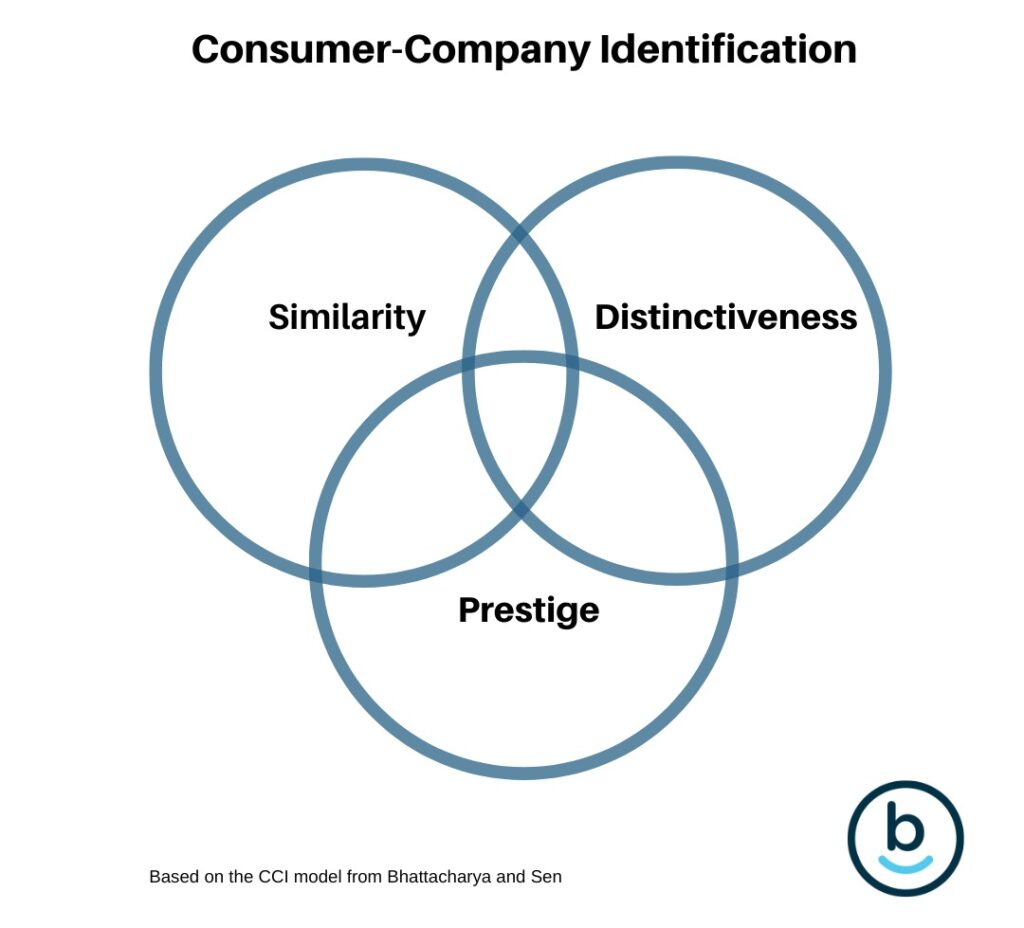Birds of a Feather Brand Together: How social identity and trust can help brokers build stronger brands (Part 1)

Consumer-Company Identification → Trust/Commitment → Loyalty Behaviours
by Steve Pieroway, Founder, Benevolent Marketing —
“All things being equal, people will do business with, and refer business to, those people they know, like, and trust.”
– Bob Burg
That’s every service provider’s Shangri-La, right? We want customers and prospects who are aware of us, like us, and think we do such a good job that they’d risk their reputation with friends and family to recommend us.
It’s easy to understand. And a lot harder to implement. But that doesn’t mean we can’t point ourselves in the right direction.
As a broker, how do you tilt the odds in your favour? How do you increase the likelihood of someone knowing, liking and trusting you?
Years ago I conducted a research study that went about trying to answer this question. The hypothesis: the more we positively identify with a company (brand), the more likely we are to trust and commit to the brand, thus increasing our desire to buy again AND refer others to them.
Or, stated in equation form:
Consumer-Company (Brand) Identification + Trust/Commitment = Repeat business and Referrals
For context, this study was conducted in the Canadian airline industry with WestJet and Air Canada as the target companies.
The results?
Before we get to the proof, let’s look at the pudding and dig into the model.
Consumer-Brand Identification
Coined by academics Bhattacharya and Sen, Consumer-Company Identification, based on social identity theory, puts forth that some of the deepest, most meaningful relationships are based on identity similarity, identity distinctiveness and identity prestige.

Identity Similarity
“Birds of a feather flock together.”
— William Turner
We humans are social creatures. As such, we’re motivated to be around people who share similar interests, values and beliefs.
Identity similarity, then, is the perceived similarity between a consumer’s own identity and a company’s perceived organizational identity. The closer a person believes a company to have the same values and beliefs, the more likely they are to find the company’s identity attractive. That is to say, to ‘like’ the company.
The consumer-company dynamic creates an ‘in-group’ of shared beliefs and values. Look at Crossfitters. There’s an entire culture around being a Crossfit enthusiast. They train hard with HIIT workouts, eat keto or high-protein diets, and even have a competition to determine the most fit person. This community even has their own vocabulary. WOD. Helen. Fran. Cindy. Murph.
IYKYK.
Identity Distinctiveness
As much as people want to “fit in” with certain social groups, there’s a need to paradoxically “stand out” as well. A key tenet of social identity theory is that people look to differentiate themselves from relevant ‘out-groups’ in social settings.
In-group loyalty and survival is correlated to the level of perceived distinctiveness among relevant outgroups. And having an out-group brings to light group differences, helping to assure the person of their in-group standing.
Let’s go back to the Crossfitters and compare them to long distance runners. Both groups are athletes. Yet, everything about them is different. Their training methods. Where they train. The vocabulary they use. Both groups have similar in-group norms, but are distinct from the relevant out-group.
Identity Prestige
At its core, identity prestige is the desire to “bask in the reflected glory” of the company. It’s a customer’s perception of how successful and important others view the company with which the person identifies.
Now, this might seem a bit shallow at first blush. But if you look, it’s all around us. Clubs. Associations. Memberships. We look to the brand image of these things as a guide, and when we’re included in the group, it gives us a boost. We feel included, and potentially even a bit special.
If you knew the WestJet of the 2000’s, it would be easy to see this idea of ‘reflected glory’ in action. WestJet’s success was everyone’s success. And to those followers, it felt good to be part of the WestJet party because they knew others, their in-group, held WestJet with such high esteem.
Identity in Brand
As Bob Burg said, when all else is equal, we’ll do business with those we know, like and trust. How much we ‘know’ and ‘like’ a company, or brand, is dependent on the strength of identity similarity, distinctiveness and prestige.
In the next article, we’ll see the impact of trust and commitment on the brand relationship and how this impacts loyalty behaviours, like referrals and repeat purchasing.
To be continued…
About The Author
Let’s face it: marketing and sales is hard enough. Marketing and selling a service like insurance? Even harder.
Standing out from the crowd when you sell the same product, and have the same credentials, as everyone else isn’t easy. But, it’s necessary. Using a unique relationship marketing framework he developed, Steve helps brokerages do just that: stand out from the crowd.
Prior to starting Benevolent Marketing, Steve was with Policy Works where he led the Marketing, Sales and Client Services teams (not all at once, though). Thankfully, he was never allowed to code, though it was his one secret desire.
While at Policy Works, he led the drive to double monthly recurring revenue, created the Commercial Management System (CMS) category, the Policy Works Ninja campaign and the Broker Appreciation Week t-shirt giveaway.
Now, he’s bringing his talents to the brokerage community (IYKYK, right basketball fans?). And he couldn’t be happier.
About Benevolent Marketing
Benevolent Marketing is brand positioning and strategy for insurance brokers. Why benevolent? Because it’s one of the three pillars of trust, along with capability and reliability. And in credence-based services, trust is king.
We help insurance brokers build a unique brand, so that when an insured is ready to change providers, they’re attracted to you. For more information, please visit www.benevolentmarketing.com.
SOURCE: Benevolent Marketing



